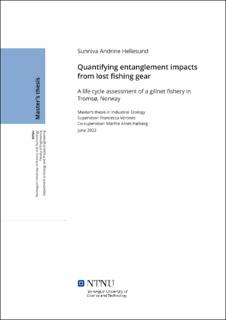| dc.contributor.advisor | Verones, Francesca | |
| dc.contributor.advisor | Høiberg, Marthe Alnes | |
| dc.contributor.author | Hellesund, Sunniva Andrine | |
| dc.date.accessioned | 2022-10-04T17:22:35Z | |
| dc.date.available | 2022-10-04T17:22:35Z | |
| dc.date.issued | 2022 | |
| dc.identifier | no.ntnu:inspera:110283387:68777862 | |
| dc.identifier.uri | https://hdl.handle.net/11250/3023796 | |
| dc.description.abstract | Plast fortsetter å akkumulere i havet på grunn av mangelfulle avfallshåndteringssystemer og direkte deponering eller tap i havet. Plast i det marine miljøet er kjent for å forårsake påvirkninger som innvikling og inntak på grunn av at marine arter samhandler med avfall. Selv om konsekvensene av plastsøppel har fått økt oppmerksomhet, tar ikke bærekraftsverktøy som livssyklusanalyse (LCA) foreløpig hensyn til plastavfall som et utslipp. Som sådan er det et metodisk hull innenfor LCA-rammeverket. Denne oppgaven bidrar til å håndtere dette metodiske hullet ved å redegjøre for miljøpåvirkningene knyttet til tapte fiskeredskaper, nærmere bestemt garn, i Tromsø i Nord-Norge ved å gjennomføre en forenklet LCA. Til dette formålet ble LCA-programvaren Brightway2 som er basert på programmeringsspråket Python brukt. ReCiPe 2008-metoden på endepunkt med et hierarkistisk perspektiv ble brukt som metode i karakteriseringsfasen. Videre har oppgaven som mål å teste den nyutviklede CF for innvikling som en mulig påvirkningsvei til tap av biologisk mangfold ved å justere tapsraten for garn. Hovedfunnene i den forenklede LCA-studien var at antallet mulig tapte arter hovedsakelig skyldtes global oppvarming og produksjon og bruk av drivstoff til fiskefartøyet, mens innvikling på grunn av tapt garn bidro minst til artstapet. Testen av CF for innvikling viste at en økning i tapsraten førte til artstap fire ganger høyere enn det opprinnelige resultatet. Selv om innvikling i garn bidro minst til de totale effektene i denne studien, indikerer resultatet at tap av garn fører til artstap. Derfor er relevansen av å inkludere sammenfiltring av marine arter i makroplast i fremtidige LCA-studier betydelig. | |
| dc.description.abstract | Plastics are continuing to accumulate in the ocean due to mismanaged waste or directly disposal or loss in the ocean. Plastic in the marine environment is known for causing impacts such as entanglement and ingestion due to marine species interacting with debris. Even though the consequences of plastic debris have received increased attention, sustainability tools such as life cycle assessment (LCA) does not yet account for plastic as a pollutant. As such, there is a methodological gap within the LCA framework. This thesis contributes to tackle this methodological gap by accounting for the environmental impacts associated with lost fishing gear, specifically gillnets, in Tromsø in northern Norway by conducting a simplified LCA. For this purpose, the LCA software Brightway2 which is based on the programming language Python was used. The ReCiPe 2008 method at an endpoint level with a hierarchist perspective was applied as the impact assessment method. Further, the thesis aims at testing the newly developed characterization factor (CF) for entanglement as a potential impact pathway to loss of marine biodiversity by adjusting the loss rate of gillnets. The main findings of the simplified LCA study were that the number of potentially lost species was mainly due to global warming and the production and use of fuel for the fishing vessel, whereas entanglement due to lost gillnet contributed the least to species loss. The test of the CF for entanglement showed that an increase in the loss rate led to species loss of four times higher than the initial result. Even though entanglement contributed the least to overall impacts in this study, the result indicate that the leakage of gillnets leads to species loss. As such, the relevance of including entanglement of marine species in macroplastic in future LCA studies is significant. | |
| dc.language | eng | |
| dc.publisher | NTNU | |
| dc.title | Quantifying entanglement impacts from lost fishing gear | |
| dc.type | Master thesis | |
